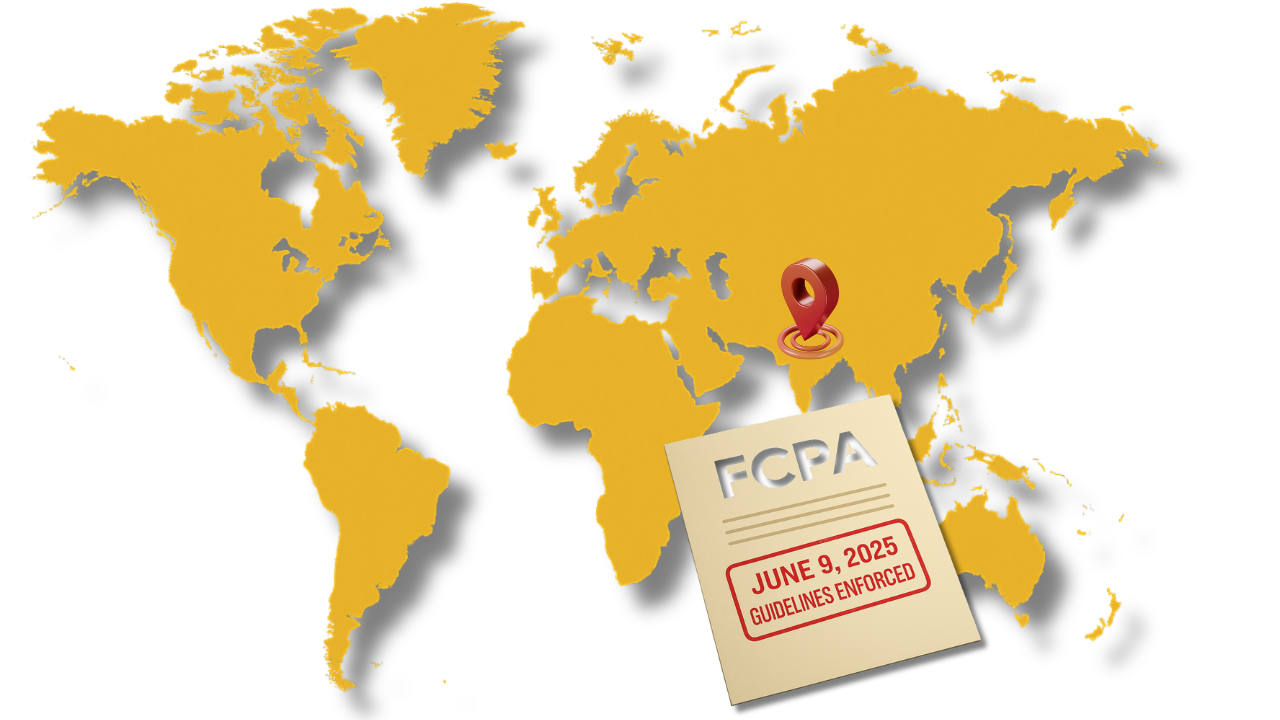Introduction
A significant recalibration of global anti-corruption efforts is underway. On June 9, 2025, following a temporary halt on enforcement activities, the U.S. DOJ1 unveiled its long-awaited guidance for investigations and enforcement of the FCPA2. This isn’t just a re-ignition of past policies; it’s a strategic re-orientation, marking a new chapter in how the U.S. will tackle white-collar crime, with a clear directive to safeguard and advance American interests. As Matthew R. Galeotti, Head of the DOJ’s Criminal Division, articulated at a recent American Conference Institute conference, the message is unequivocal: “Now is the moment for concerted action.”
But what does this revamped approach truly signify, and how will it influence companies operating internationally, particularly those in a dynamic and expanding economy like India?
A Sharper Lens: The Core Principles of New FCPA Enforcement
The essence of the new FCPA guidelines lies in a dual mandate: to “alleviate unnecessary burdens on American businesses operating overseas” and to “concentrate enforcement actions on conduct that directly undermines U.S. national interests.” This represents a distinct departure from previous, more broadly defined enforcement strategies. The Department is now zeroing in on “high-impact cases,” especially where corrupt practices inflict direct harm on American economic competitiveness.
The FCPA Guidelines, alongside accompanying statements from DOJ officials, illuminate several critical areas that will shape future investigations and enforcement actions. A primary focus will be combating organized crime. The administration’s unwavering resolve to dismantle cartels and TCOs3, which means prosecutors will intensely scrutinize alleged misconduct linked to the illicit activities of these groups, the use of money laundering schemes or shell companies associated with them, or bribery involving foreign officials who also accept illicit payments from such entities. This heightened focus could lead to increased enforcement in regions with persistent struggles against organized crime, including parts of Latin America, Africa, China, and Russia. For businesses, this translates to a more rigorous examination of their supply chains and business partnerships.
Equally paramount is protecting U.S. economic integrity. A central consideration is whether alleged wrongdoing deprived “specific and identifiable” U.S. entities of fair market access or caused financial detriment to American companies or individuals. The DOJ may also leverage the Foreign Extortion Prevention Act FEPA4 to address the demand side of foreign bribery, particularly concerning corruption involving “critical infrastructure or assets.” While a company’s national origin isn’t a definitive factor, the emphasis on harm to U.S. interests could lead to increased scrutiny of non-U.S. entities.
Furthermore, FCPA enforcement will place a high priority on safeguarding national security sectors. This expansive definition includes preserving competitive advantages in strategic sectors such as critical minerals, deep-water ports, defense, energy, and essential infrastructure. Bribery schemes involving foreign officials in these sensitive areas are likely to attract significant enforcement resources. The Department’s attention will also be drawn to substantial and egregious corruption, focusing on large-scale bribes, sophisticated methods to conceal illicit payments, fraudulent activities designed to facilitate bribery, and attempts to obstruct justice. This suggests a less stringent approach to minor “generally accepted business courtesies,” though this poses practical complexities for companies navigating diverse global commercial norms. The emphasis is firmly on individual accountability and instances of blatant corrupt intent, rather than routine commercial practices.
Beyond the Bullseye: Broader Enforcement Directives
The new guidelines don’t just define what the DOJ will target, but also how it will execute its enforcement mandate. Several overarching themes emerge from the DOJ leadership’s supplemental commentary. The DOJ’s expectations are clear regarding the incentive and deterrent of self-reporting: companies are encouraged to thoroughly investigate, voluntarily disclose, cooperate fully, and swiftly remedy misconduct. The “incentive” is the prospect of a declination (with limited exceptions) for those who come forward first. The “deterrent” is a warning of prompt and aggressive action against those who fail to self-disclose or cooperate effectively.
The ongoing importance of whistleblower insights remains a crucial conduit for information. The DOJ’s whistleblower hotline continues to receive “robust tips,” and even those submitted during the recent enforcement “hiatus,” are actively under review and are expected to generate new FCPA investigations. Companies under investigation should also prepare for expedited review processes. This means a quicker pace, and early engagement with the DOJ might even trigger swift involvement from other regulatory bodies, including the SEC. While this heightened efficiency may be welcomed by some, it necessitates rapid internal investigation and remediation by companies. Lastly, the Guidelines suggest an increased deference to international partners (with conditions). The DOJ may be more inclined to defer to foreign investigations if a foreign government demonstrates the willingness and capacity to investigate the alleged misconduct, and if U.S. interests are not directly implicated. This marks a shift from past practices that often involved close cooperation in pursuing parallel actions.
Implications for International Businesses, Particularly in India
This revised FCPA enforcement framework carries substantial implications for companies operating on a global scale, and Indian enterprises are certainly not exempt. There will be enhanced scrutiny for foreign entities. While the DOJ’s overall enforcement scope has been refined, foreign companies, including those in India, may face intensified scrutiny, particularly if their operations intersect with U.S. strategic interests, such as critical resources or infrastructure projects, or if they have ties to transnational criminal organizations. The focus on safeguarding U.S. competitive interests means that non-U.S. companies that gain an unfair advantage through bribery, to the detriment of a U.S. competitor, are likely to be on the radar.
The evolution of U.S. enforcement practices could also inspire other nations to bolster their own anti-corruption measures, leading to a potential for parallel enforcement abroad. We’ve already observed instances, such as China’s new guidelines encompassing bribery-related blacklisting and “carbon copy” prosecutions. This means Indian companies must navigate an increasingly intricate and interconnected web of international anti-corruption regulations. Consequently, a strategic business reassessment imperative arises. Indian companies will need to critically re-evaluate their operational strategies, including a thorough examination of existing partnerships, rigorous vetting of supply chains for potential links to cartels or TCOs, and a re-assessment of market entry strategies to ensure robust compliance with both U.S. and local anti-corruption statutes. Finally, the DOJ’s increased inclination to defer to foreign regulators when U.S. interests are not directly involved represents a notable shift in collaborative enforcement dynamics. While this might lead to fewer direct parallel actions in certain scenarios, Indian companies could still face investigations and prosecutions from their own domestic authorities or other international regulators.
Charting the Course for Indian Companies
The message is unambiguous: FCPA enforcement has transformed, and it’s back with renewed resolve. Indian companies should not perceive this as a diminished threat, but rather as a more precisely aimed one. Proactive measures are absolutely essential to navigate this evolving regulatory terrain and mitigate potential exposures.
To begin, fortifying and refining compliance frameworks is fundamental. Indian companies should undertake a comprehensive review of their existing compliance systems to identify and rectify any deficiencies. This entails ensuring that policies are up-to-date with both global and local anti-corruption benchmarks and are specifically tailored to the unique risks inherent in their business operations and geographical presence. Furthermore, embedding continuous compliance training across all organizational tiers is vital to cultivate awareness and ingrain ethical conduct throughout the enterprise.
Given the dynamic nature of the global regulatory environment, staying abreast of regulatory development is crucial. Companies must establish robust mechanisms to track evolving anti-corruption trends, including concepts like “carbon copy” prosecutions and blacklisting. Collaborating with legal or regulatory specialists can provide invaluable insights and ensure proactive adaptation to these changes. The complexities of navigating diverse global and domestic anti-corruption laws necessitate specialized guidance, making it imperative to proactively engage legal expertise. Indian companies should actively seek counsel from legal professionals specializing in anti-corruption compliance. These experts can provide invaluable assistance in drafting effective policies, managing internal investigations, and ensuring adherence to both local and international regulations, thereby significantly reducing potential legal vulnerabilities.
Beyond mere procedural compliance, cultivating a strong ethical culture is paramount. This begins at the highest levels, with leadership unequivocally demonstrating integrity. Companies should encourage transparency through open communication channels and actively recognize and reward employees who exemplify ethical behavior. Such a culture not only minimizes instances of misconduct but also enhances the company’s reputation on the international stage.
The latter half of 2025 is anticipated to witness a surge of new enforcement actions as the DOJ progresses it’s pipeline of ongoing matters, including a potential backlog of whistleblower complaints. For Indian companies, the window for action is now. By proactively addressing these areas, they can bolster their defenses, adapt to the shifting currents of FCPA enforcement, and continue to thrive in a global economy that increasingly places a premium on integrity.
Charting the Course for Indian Companies
The message is unambiguous: FCPA enforcement has transformed, and it’s back with renewed resolve. Indian companies should not perceive this as a diminished threat, but rather as a more precisely aimed one. Proactive measures are absolutely essential to navigate this evolving regulatory terrain and mitigate potential exposures.
To begin, fortifying and refining compliance frameworks is fundamental. Indian companies should undertake a comprehensive review of their existing compliance systems to identify and rectify any deficiencies. This entails ensuring that policies are up-to-date with both global and local anti-corruption benchmarks and are specifically tailored to the unique risks inherent in their business operations and geographical presence. Furthermore, embedding continuous compliance training across all organizational tiers is vital to cultivate awareness and ingrain ethical conduct throughout the enterprise.
Given the dynamic nature of the global regulatory environment, staying abreast of regulatory developments is crucial. Companies must establish robust mechanisms to track evolving anti-corruption trends, including concepts like “carbon copy” prosecutions and blacklisting. Collaborating with legal or regulatory specialists can provide invaluable insights and ensure proactive adaptation to these changes. The complexities of navigating diverse global and domestic anti-corruption laws necessitate specialized guidance, making it imperative to proactively engage legal expertise. Indian companies should actively seek counsel from legal professionals specializing in anti-corruption compliance. These experts can provide invaluable assistance in drafting effective policies, managing internal investigations, and ensuring adherence to both local and international regulations, thereby significantly reducing potential legal vulnerabilities.
Beyond mere procedural compliance, cultivating a strong ethical culture is paramount. This begins at the highest levels, with leadership unequivocally demonstrating integrity. Companies should encourage transparency through open communication channels and actively recognize and reward employees who exemplify ethical behavior. Such a culture not only minimizes instances of misconduct but also enhances the company’s reputation on the international stage.
Conclusion: A New Horizon of Responsibility
As the U.S. Department of Justice fully re-engages with FCPA enforcement, Indian businesses face a landscape that is both more focused and, in some ways, more demanding. The emphasis on protecting specific U.S. economic and national security interests, coupled with the intensified pursuit of substantial corruption and organized criminal linkages, means that while the overall volume of cases might shift, the severity and strategic importance of those pursued will likely increase. This new approach pushes Indian companies to move beyond a purely reactive compliance mindset towards a proactive, risk-intelligent framework that anticipates evolving global expectations.
The coming months, particularly the latter half of 2025, are anticipated to witness a surge of new enforcement actions as the DOJ progresses its pipeline of ongoing matters, including a potential backlog of whistleblower complaints. For Indian companies, the window for action is unequivocally now. By proactively bolstering their defenses, meticulously adapting to the shifting currents of FCPA enforcement, and embracing a culture of unwavering integrity, they can not only mitigate potential legal and reputational risks but also carve out a stronger, more trusted position in the global economy. Indeed, the pressing question for the future is: Will India’s proactive commitment to strict anti-corruption measures emerge as a competitive advantage, attracting more ethical global partnerships and investment in this reconfigured international landscape?
Citations
- Department of Justice
- Foreign Corrupt Practices Act
- Transnational criminal Organisation
- Foreign Extortion Prevention Act
Expositor(s): Anuja Pandit






